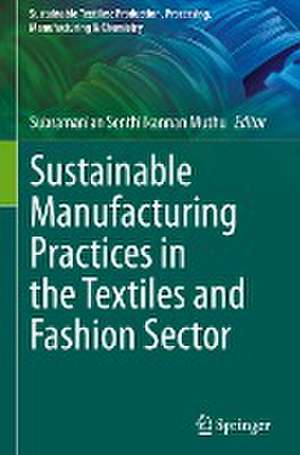Sustainable Manufacturing Practices in the Textiles and Fashion Sector: Sustainable Textiles: Production, Processing, Manufacturing & Chemistry
Editat de Subramanian Senthilkannan Muthuen Limba Engleză Hardback – 14 feb 2024
Din seria Sustainable Textiles: Production, Processing, Manufacturing & Chemistry
- 24%
 Preț: 778.71 lei
Preț: 778.71 lei - 18%
 Preț: 726.37 lei
Preț: 726.37 lei - 20%
 Preț: 567.99 lei
Preț: 567.99 lei - 18%
 Preț: 790.28 lei
Preț: 790.28 lei - 18%
 Preț: 1002.61 lei
Preț: 1002.61 lei - 18%
 Preț: 951.29 lei
Preț: 951.29 lei - 18%
 Preț: 781.62 lei
Preț: 781.62 lei - 18%
 Preț: 895.45 lei
Preț: 895.45 lei - 15%
 Preț: 583.93 lei
Preț: 583.93 lei - 15%
 Preț: 694.04 lei
Preț: 694.04 lei - 15%
 Preț: 637.46 lei
Preț: 637.46 lei - 15%
 Preț: 575.77 lei
Preț: 575.77 lei - 15%
 Preț: 576.09 lei
Preț: 576.09 lei - 15%
 Preț: 578.05 lei
Preț: 578.05 lei - 15%
 Preț: 637.78 lei
Preț: 637.78 lei - 15%
 Preț: 579.34 lei
Preț: 579.34 lei - 15%
 Preț: 701.72 lei
Preț: 701.72 lei - 15%
 Preț: 642.64 lei
Preț: 642.64 lei - 18%
 Preț: 948.79 lei
Preț: 948.79 lei - 15%
 Preț: 575.09 lei
Preț: 575.09 lei - 15%
 Preț: 696.68 lei
Preț: 696.68 lei
Preț: 692.85 lei
Preț vechi: 866.06 lei
-20% Nou
Puncte Express: 1039
Preț estimativ în valută:
132.61€ • 143.14$ • 111.19£
132.61€ • 143.14$ • 111.19£
Carte disponibilă
Livrare economică 29 martie-12 aprilie
Livrare express 15-21 martie pentru 38.09 lei
Preluare comenzi: 021 569.72.76
Specificații
ISBN-13: 9783031513619
ISBN-10: 3031513614
Pagini: 326
Ilustrații: VIII, 326 p. 122 illus., 102 illus. in color.
Dimensiuni: 155 x 235 x 23 mm
Greutate: 0.68 kg
Ediția:1st ed. 2024
Editura: Springer Nature Switzerland
Colecția Springer
Seria Sustainable Textiles: Production, Processing, Manufacturing & Chemistry
Locul publicării:Cham, Switzerland
ISBN-10: 3031513614
Pagini: 326
Ilustrații: VIII, 326 p. 122 illus., 102 illus. in color.
Dimensiuni: 155 x 235 x 23 mm
Greutate: 0.68 kg
Ediția:1st ed. 2024
Editura: Springer Nature Switzerland
Colecția Springer
Seria Sustainable Textiles: Production, Processing, Manufacturing & Chemistry
Locul publicării:Cham, Switzerland
Cuprins
Chapter 1: Sustainable Manufacturing Practices in Textiles and Fashion.- Chapter 2: Salt-Free Dyeing of Cellulosic Fibers.- Chapter 3: Sustainable Approaches in Textile Sizing Process.- Chapter 4: Recent trends in sustainable garment manufacturing .- Chapter 5: Take-Back Programs for Fashion Brands’ Garments in Sustainable Manufacturing Systems.- Chapter 6: The awakening of an environmental conscious fashion era.- Chapter 7: Catalytic Methods for Sustainable Textile Dyeing.- Chapter 8: Date palm leaf mat: a sustainable textile craft: a way to a sustainable life.- Chapter 9: Sustainable Performance Assessment of Textile and Apparel Industry in a Circular Context.- Chapter 10: Manmade Bio-based and Biodegradable Fibres for Textile Applications.- Chapter 11: Sustainable Fashion Manufacturing System in Korean Fashion Industry.- Chapter 12: Recycling Practices of Post-Industrial Waste Generated From Textile Industry.
Notă biografică
Dr. Subramanian Senthilkannan Muthu is currently the Chief Sustainability Officer at Green Story Inc, Canada, based out of Hong Kong. He earned his PhD from The Hong Kong Polytechnic University, and is a renowned expert in the areas of Environmental Sustainability in Textiles & Clothing Supply Chain, Product Life Cycle Assessment (LCA) and Product Carbon Footprint Assessment (PCF) in various industrial sectors. He has five years of industrial experience in textile manufacturing, research and development and textile testing and over a decade's of experience in life cycle assessment (LCA), carbon and ecological footprints assessment of various consumer products. He has published more than 100 research publications, written numerous book chapters and authored/edited over 150 books in the areas of Carbon Footprint, Recycling, Environmental Assessment, Life Cycle Assessment and Environmental Sustainability.
Textul de pe ultima copertă
Environmental impacts created by the entire textile and fashion supply chain have been an important topic of discussion in recent decades. Different life cycle phases of a textile product from raw material extraction through manufacturing to consumer use and disposal are all responsible for various magnitudes of environmental impact. Mitigating the environmental impacts created by the textile manufacturing sector is of paramount import as manufacturing is a critical point to alleviate the impacts arising from the entire textiles and clothing supply chain. This contributed volume is meant to illustrate and draw useful conclusions from initiatives taken by the textile manufacturing sector and to identify key practices invented and being practiced by textiles and clothing manufacturers toward making the industry more sustainable.
Caracteristici
Offers context and new developments in sustainable manufacturing practices in the textiles and fashion sectors Provides information on modern applications of traditional techniques in textile manufacture Discusses various interesting topics such as salt-free dyeing and pigment extraction
